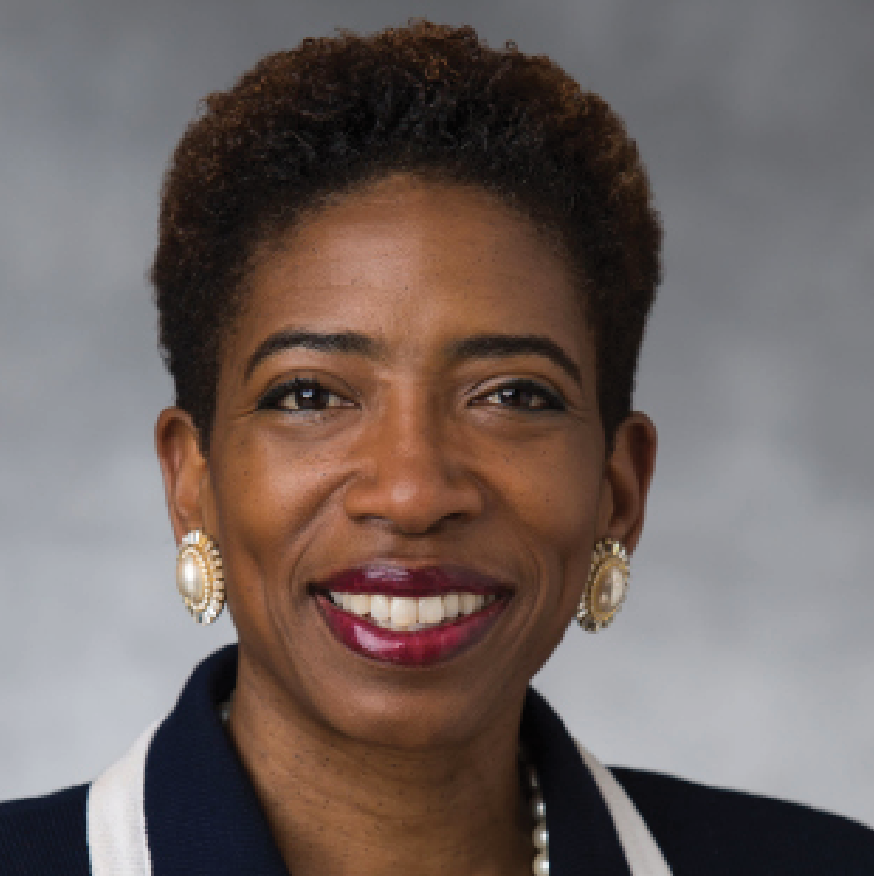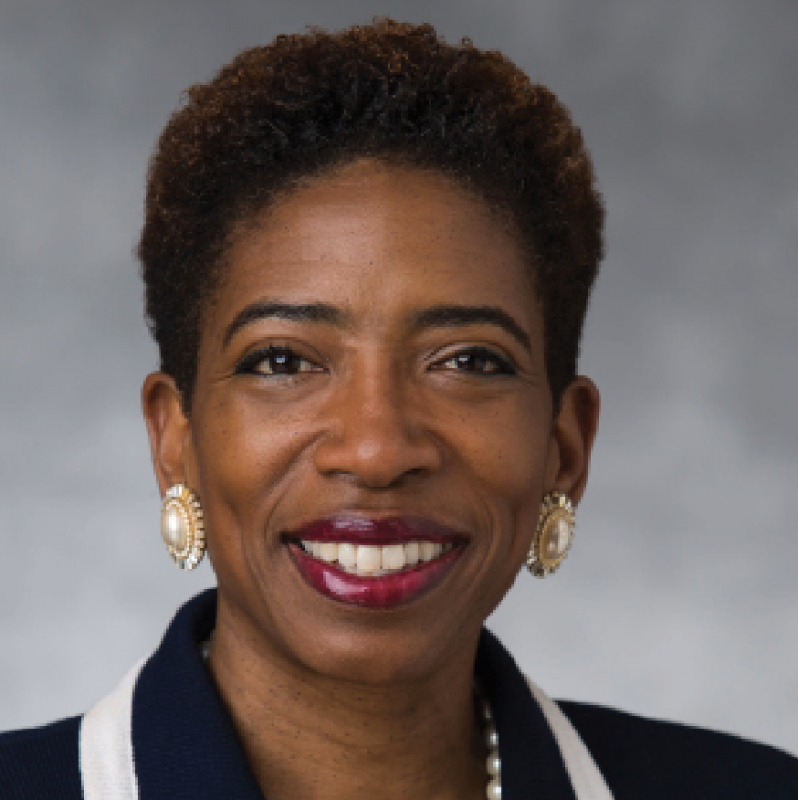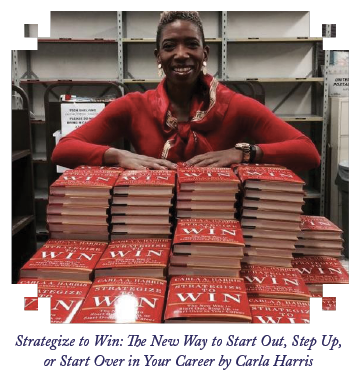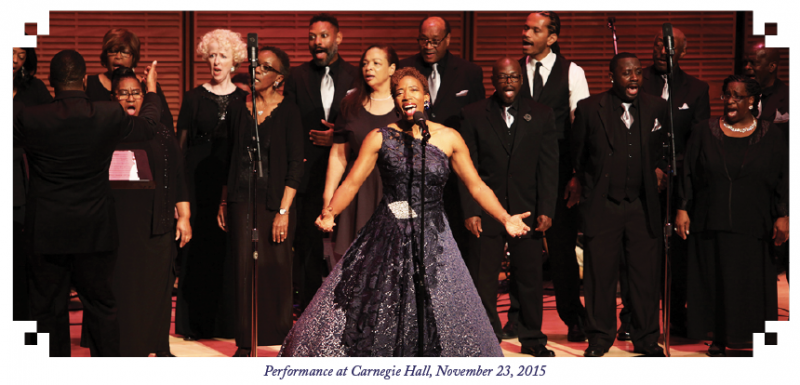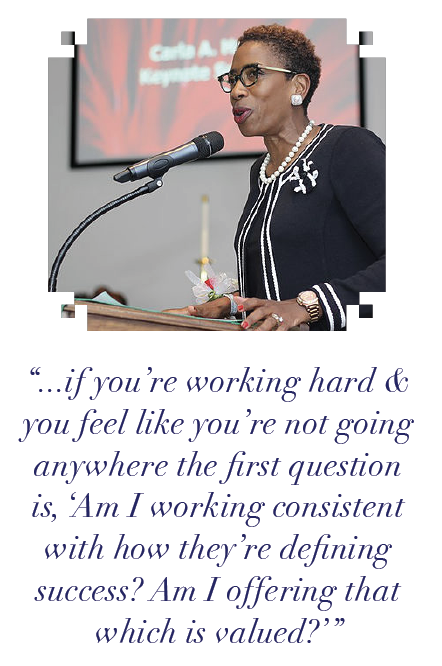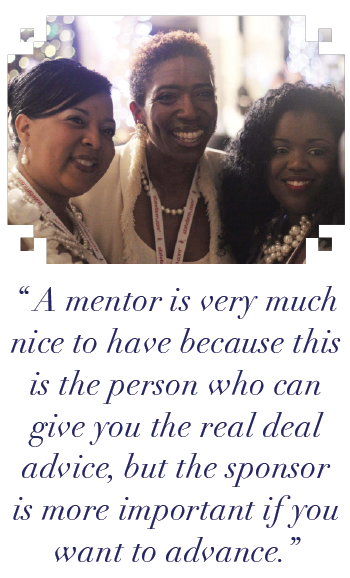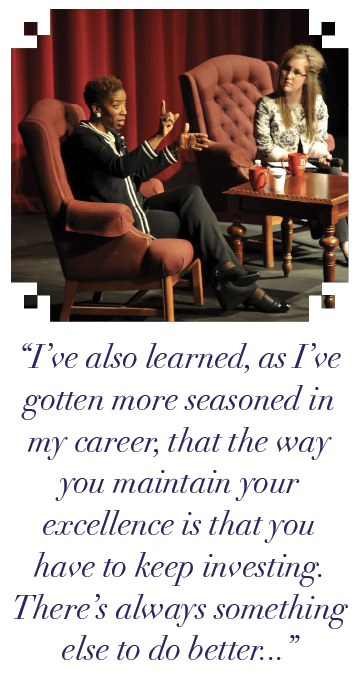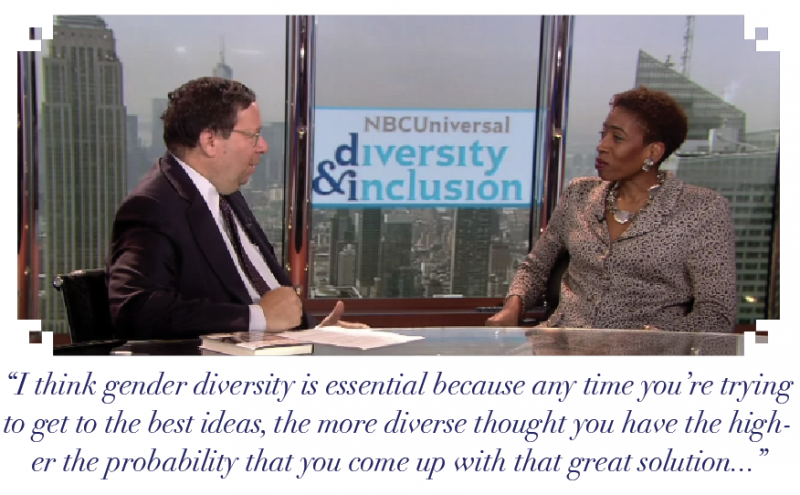Vice Chairman, Global Wealth Management and Senior Client Advisor at Morgan Stanley Appointed by President Barack Obama Chair of the National Women’s Business Council
Carla Harris
From Wall Street powerhouse to selling out Carnegie Hall five times, critically-acclaimed author and speaker Carla Harris is a Renaissance woman. She details her journey through the competitive professional environment and her experience as a new mother, sharing the importance of family in her life and delineating the way a person can steer their career through dedication and perception.
NAWRB: Who has inspired you most throughout your life? How important do you believe having a mentor or supporter is to women professionals?
Carla Harris: My greatest inspiration I would have to say is my mother, because she was the master multi-tasker. So I grew up with a lens that you could have it all. The fact that you could be a wife, a mother, a professional and somebody who’s involved in the community was just sort of my norm. I look back now and hear how many professional women say, “You can’t have it all,” and I cringe when I hear that because I grew up with a different experience and therefore, I have tried to live my life that way.
Mentorship is important, and let me just make this distinction, I have talked about this in public before and in fact, I’ve been talking about it since 1990. A mentor is important because that’s the person you can tell the good, the bad and the ugly to and that person’s job is to give tailored advice, tailored specifically to you and to your career, unlike a sponsor. A sponsor is a person who is carrying your paper into the room. That’s the concept I’ve been talking about since 1990.
Now you hear other people talking about it, writing books about it, doing research on it and I’m actually thrilled because they’re keeping the concept very much alive. A sponsor carries your paper into the room and will use social and political capital on your behalf to advance your promotion, your goals, your next opportunity. And frankly, of the two, the sponsor is more important because that’s the one that’s going to allow you to ascend. You can survive a long time in your career without a mentor, but you will not ascend without a sponsor. A mentor is very much nice to have because this is the person who can give you the real deal advice, but the sponsor is more important if you want to advance.
NAWRB: Can we say on the record that you’re actually the one who originated the mentor vs. sponsor concept in 1990?
Carla Harris: Yes, I’m the one who talked about it. We can absolutely go on the record and say that. When I started talking about sponsorship in 1990, and the first time I used the term was at the University of Michigan when I was giving a speech for the black business school association, nobody was talking about sponsorship. You heard people say champions, and advocates and all of this, but I introduced the concept of what a real sponsor was and just kept talking about it every speech I gave. It was picked up by other people from there.
NAWRB: In times of professional doubt, when women recognize their hard work is not reaping the results and recognition it should, what is the most important thing on which they should reflect and take action?
Carla Harris: Yes, they need to ask themselves, are they offering that which is valued? So often, we think we know what working hard looks like and we embark upon doing that, and you can work really hard, but if you’re working in a way that is inconsistent with the way your organization is defining success, you won’t maximize your success. You’re working hard, but you’re offering something that is not of value. Let’s say you’re thinking, “Well, I did all this background research and it really makes the story more interesting because of all the hours I spent doing the background research.” Well, maybe your editor doesn’t care about your background research, they care about the wow factor, the way you position the story, the way you compare that subject to somebody else and they could have cared less about going all the way back to the person’s childhood.
So it’s important that if you’re working hard and you feel like you’re not going anywhere the first question is, “Am I working consistent with how they’re defining success? Am I offering that which is valued?” Number one. Number two, “Have I invested enough in the relationships around me?” Because sometimes we focus so much on the performance currency, but it’s the relationship currency that allows you to move as you get a little bit more senior.
And third, “Have I evaluated whether or not this is the right environment? Perhaps I have outgrown this seat, and maybe I have even outgrown the house.” It’s important that you understand that, because that tells you when it’s time to make a change.
NAWRB: What is your proudest moment, both personally and professionally?
Carla Harris: I would have to say personally, and there are a lot of moments that I’m proud of personally, I mean, obviously now one is becoming a new mother. I’d have to put that as number one, but there are lots of things that I was able to do while my parents were alive that I was so happy they got a chance to see and to experience. I’d say that I’ve been enormously blessed to have a lot of important personal moments, and very few that I would put one above the other.
Professionally, I would say, is being able to be in this business in what I will call a large position, actually responsible for executing transactions and getting deals done. Really being on the line as opposed to not on the line. Being able, most importantly, to impact other peoples’ successes. I’d say that is something, as I think about almost all the years in this business that I am most proud of. And not just people within my own firm, people within the industry.
NAWRB: What is the meaning and importance of family in your life?
Carla Harris: Family is very important, and I’ll tell you the more seasoned I get the more important I can see that it is. And even if you don’t have your immediate family around, making the people that are around you feel important and like family I think is enriching in both ways. The other thing that I’ve noticed too is that you never know whom you’re going to impact. You never know how giving and encouraging worth to someone or saying something that will empower them in that moment, you have no idea the impact that you could be having on someone. So that’s something that I try to actively do.
There was a woman at the White House last night who came up to me and said, “You said something back in 2009 and I have to tell you, it really impacted me.” And she said it, I remembered what it was but I thought to myself, “Wow, who would have known or thought that seven years later this woman would have taken that thing and made it part of what motivates her through, especially through tough times, or makes her stand up a little bit straighter?” It’s amazing so I think you should always be mindful of that, especially in time when you’re not feeling powerful, when you’re not feeling like things are going well, you have to remind yourself you still do have power to impact, and you should use it just because.
NAWRB: You are an incredible singer with three CDs and five sold-out shows at Carnegie Hall. What does singing mean to you and what role has it played in your life? Have you set any goals or achievements in your singing career that you have yet to reach?
Carla Harris: The goal that I want to accomplish from a singing perspective before I hang up my singing cleats would be to get a Grammy. I used to say that it would be a singing Grammy, but I realize now they give Grammys for spoken word and for audio. So a Grammy. Frankly, I just like to sing because it gives me an opportunity to be of service in a different way. Yes I speak, yes I’m an investment banker, but sometimes singing will also “take somebody there.” Someone says, “Oh, I felt my breakthrough. Oh, that really changed my base.”
It’s another way of being able to use a gift that He gave me to impact people. And it impacts me every time I have an opportunity to do it, whether it’s in Carnegie Hall, in my church or even singing on the stage when someone asks, “Oh, can you sing something for us?” Which I often do. Even that is an opportunity, if you will, to serve.
NAWRB: One of the Pearls you speak on is fear and the importance of taking risks. What are some of the defining risks you have taken throughout your life and what was their outcome?
Carla Harris: One of the biggest ones was saying no to someone who was a potential sponsor as they asked me to take on a different level of responsibility. It was at a critical time when I was up for the big promotion of Managing Director, and the year before somebody who I was targeting as a sponsor for me asked if I would go on a different road. In my heart of hearts, deep in my gut, I knew that if I stayed in my current seat I had a heightened probability of being able to get the promotion, but if I moved at my current point it might put that promotion in peril, number one. Number two, it would give the organization the opportunity to say, “Well, she’s doing a great job in this role now, but she needs to get a little bit more seasoned because it’s a new role. Let’s wait and see.”
It would have created an opportunity to wait when I felt that I had momentum on my side. But here was the risk; if I said no to that person then they might not sponsor me for the promotion. But I followed my gut and said no and I got the promotion. It was absolutely the right call because in retrospect, waiting a year, the dynamics changed and this person was no longer in the position where they could sponsor me effectively. So I would have been much more exposed had I taken that new role. It was a huge risk, but it was absolutely the right call and that person ultimately didn’t sponsor me anyway.
NAWRB: What is your favorite vacation you have taken? What was so special about that trip?
Carla Harris: It would have to be Italy, loved Italy. I’ve been to a number of great places but it’s just so wonderful with the architecture, the history, the people, the food, love it. A close second would be Spain. And again, the history that’s associated with these countries and the architecture and culture are just terrific.
NAWRB: In addition to your career at Morgan Stanley, singer and writer, is there hobby or passion dear to your heart that most people may not know you enjoy?
Carla Harris: I’m sure they know because it’s been written about, but it would have to be golf. I love, love, love playing golf. Whenever I get a chance to do it, I do it.
NAWRB: What is the most important professional lesson that you have learned during your career as an executive woman?
Carla Harris: I’ve said this before in my first book Expect to Win, perception is the copilot to reality. That was the biggest aha moment because I did not realize that you could teach people how to think about you, or that it was important to understand the perception about you in the marketplace. I was very green, I just came in thinking that I would work hard and that would be enough. But as I said at the beginning of this conversation, if you’re working in a way that is inconsistent with the way they’re thinking about success, you’re not going to maximize your success. So there you are working as hard as you possibly can, but again, you’re offering that which is not valued so you don’t get the return for your efforts. Biggest lesson, that’s my biggest lesson.
The second biggest lesson is the whole concept about sponsorship, that you can’t do it alone. The concept of putting your head down and working hard to the exclusion of investing heavily in relationships won’t get you where you want to be. It will certainly help you very early on in your career because doing well from a performance standpoint creates a reputation in the marketplace, but you will only get so far on the performance. You cannot do it alone; you’re going to need the relationships.
NAWRB: What is your favorite way to spend a day when you don’t have to worry about work or any other professional responsibilities?
Carla Harris: At this point there’s no question, it’s about hanging out with my daughter Dakota.
No question.
NAWRB: What is your favorite thing that she has done?
Carla Harris: Starting to walk, absolutely. Every new thing that they do now becomes the coolest thing. Three months ago the coolest thing was watching how she would pull herself up in her crib. Two months before that was watching how she was figuring out how to crawl, when she would grab the carpet and slide herself. Every time they do something for the first time it becomes the coolest thing.
NAWRB: What do women at all career levels, from entry-level positions to executive offices, bring to the proverbial table that men do not? How important do you think gender diversity is within the workplace?
Carla Harris: I think gender diversity is essential because any time you’re trying to get to the best ideas, the more diverse thought you have the higher the probability that you come up with that great solution that will allow you to obtain and retain that leadership position for your team or firm, because you really have thought about it from all aspects. When you have homogenous thought, there’s no way it can be as competitive as people coming up with different ideas that are offering you different perspectives, because you just don’t cover everything. It gives you the ability to lead and to retain a leadership position.
One of the things that I think women bring to the table in particular is that by nature, in most cases, we are inclusive. We are very inclusive, we foster collaboration, it’s just in our DNA without thinking about it. Whereas men don’t necessarily approach things that way. I think this is going to play very well for women’s leadership status, especially as we go forward when you start thinking about what the emerging professionals and emerging leaders require. And I mean the millennials and Generation Z, because they are used to a level of transparency that we didn’t necessarily get.
Again, I think that women tend to be transparent, they tend to foster inclusion, i.e., soliciting other peoples’ voices, and millennials and Generation Z love to be included, they like for you to solicit their views, they like being collaborative because they are brought up in teams. All the technology is open architecture, that’s what they’re used to. I think the way that we tend to manage, and I’m not saying all women do this and all men don’t, but if you just think about the default, we tend to do it. This will hold us in good stead as leaders, especially leaders in this next generation.
NAWRB: What is your favorite National Football League (NFL) team, and what is your fondest memory of rooting for them?
Carla Harris: I’m going to say I’m a fair-weather NFL fan. I like it more when it gets close to the playoffs, I don’t just come in on a Sunday afternoon and watch a game.
NAWRB: You are a Spanish speaker. How did you learn the language and how often do you get to practice it? Has speaking Spanish had an effect on your life or career?
Carla Harris: A little bit. I used to be fluent but I’ve pretty much lost it now because I don’t use it enough. So one of the things that I’m going to make sure Dakota gets early on is the ability to learn another language. As she starts to learn Spanish I will relearn it. By the time I graduated from Harvard I was fluent but I tell you, I have not used it and I graduated 32 years ago.
I just loved learning another language and as I’ve travelled around, especially when we went to Italy for the first time, having knowledge of Spanish helped a little bit. When we went to Spain for our honeymoon it helped a whole lot because I was able to help maneuver through the country even though it had been a long time since I’d studied it. It was pretty neat being able to function in those other countries where that was the dominant language, or where the language was a derivative of Spanish in some way.
NAWRB: With all of the successes you have created in your life, from being a Harvard graduate to becoming a successful singer and industry leader, how do you remain motivated and hungry? What drives you?
Carla Harris: I just have always wanted to really do well. I would have to say my parents instilled in me the appetite to operate at my highest level. My grandmother used to always say to me, “Whatever you be, be good at it.” So my attitude has always been, “If you’re going to bother doing something, try to be the best.” I’ve also learned, as I’ve gotten more seasoned in my career, that the way you maintain your excellence is that you have to keep investing. There’s always something else to do better, there’s always another way to sing the song, there’s always another riff that you don’t have on your own. There’s always something that you can do to improve upon that which you think is pretty good. Look at professional athletes who continue at the end of the day to invest.
NAWRB: You spoke at Arizona State University about the importance of perception in a person’s reality and the ways in which a person can shape how they are perceived by choosing three adjectives with which they want to be associated. What are the three adjectives Carla Harris wants used to describe her and why?
Carla Harris: Thank you for this question because the adjectives actually change over time. When I was a
first-year associate, the perception that I wanted in the marketplace was definitely analytical, quantitative, you know, tough, for example. But as I have become a managing director and a vice chairman now, the adjectives that I care about are commercial, relationship-oriented, and I still keep tough because I don’t want there to be any confusion. Again, it really goes back to what is valued in your
career. Early on in my career, people cared if I could do a spreadsheet and whether or not I had good analytical skills. But today, as a vice chairman nobody cares about spreadsheets, they care about me being commercial and forming relationships, getting clients to do business with us; this is not as valued or expected when you are a first-year associate, but it is absolutely valued and expected when you are a managing director and vice chairman.
NAWRB: Have the three adjectives changed now that you are a mother?
Carla Harris: At home, what is important is that I’m present. When I’m with her I should be present and with her. That’s generally what I do. When I’m ready to spend some time with her I’m not going to be on the phone. The biggest change being a mother has had is that it’s made me more present and focused in everything I do, even when I’m at work, if I’m in a meeting now I’m very present as opposed to multi-tasking two or three different things. Having Dakota has made me pay attention because if I’m fixing a bottle or getting something ready for her, I pay attention to what I’m doing.

 Login
Login

